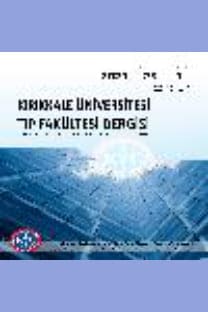ERKEK HASTALARIN PROSTAT KANSERİ TARAMALARI HAKKINDA BİLGİ DÜZEYLERİ
Bilgi düzeyi; prostat kanseri, prostat kanser taramaları
Knowledge Levels of Male Patients About Prostate Cancer Screening
___
- 1. Akdemir N, Birol L. İç Hastalıkları ve Hemşirelik Bakım Kitabı. 2. Baskı. Ankara: Sistem Ofset. 2005. pp: 245-254.
- 2. Karadakovan A, Aslan F. Dahili ve Cerrahi Hastalıklarda Bakım Kitabı. 2. Baskı. Adana: Nobel kitabevi. 2011. 201-208.
- 3. Türkiye’de Kanser Kontrolü 2009. http://onkofar.com/vImages/pdfler/2009_Turkiyedekanserkontrolu.pdf. (Erişim tarihi: 08/03/2014).
- 4. GLOBOCAN 2012: Estimated Cancer Incidence, Mortality and Prevalence Worldwide in 2012. http://globocan.iarc.fr/Pages/fact_sheets_cancer.aspx. (Erişim tarihi: 09/03/2014).
- 5. Türkiye Cumhuriyeti Sağlık Bakanlığı: Sağlık İstatistikleri Yıllığı 2010. http://www.saglik.gov.tr/TR/dosya/1-72577/h/saglikistatistikleriyilligi2010.pdf. (Erişim tarihi: 08/03/2014).
- 6. Türkiye’de Prostat Kanseri İnsidansı: Epidemiyolojik bir Çalışma (PROSTATTURK). http://uroonkoloji9.naklenkongre.com/sunumlar/210800.pdf. (Erişim tarihi: 09/03/2014).
- 7. Jemal A, Murray T, Ward E, Samuels A, Tiwari RC, Ghafoor A et al. Cancer statistics, 2005. CA Cancer J Clin. 2005;55(1):10-30.
- 8. Prostat kanseri hastalar için bir kılavuz 2008. http://www.krebsgesellschaft-nrw.de/d_service/b_runterladen/Prostata.pdf. (Erişim tarihi: 08/03/2014) 9. Yüksel İ, Kaplan M. Prostat kanseri önlenebilir mi? Üroonkoloji Bülteni. 2011;2:17-21.
- 10. Ekin RG, Zorlu F. Türkiye verilerine göre prostat kanseri taranmalı mı? Üroonkoloji Bülteni. 2013;12:71-75.
- 11. Türkeri L. Prostat kanserinde tarama ve kanser gelişimini önlemenin güncel durumu. Üroonkoloji Bülteni. 2009;1:14-15.
- 12. Schröder FH, Hugosson J, Roobol MJ, Tammela TLJ, Ciatto S, Nelen V et al. Screening and prostate-cancer mortality in a randomized european study. The new england journal of medicine. 2009;360:1320-1328.
- 13. Etzioni R, Gulati R, Cooperberg MR, Penson DM, Weiss NS, Thompson IM. Limitations of basing screening policies on screening trials. Med Care. 2013;51:295-300.
- 14. Arkes HR, Gaissmaier W. Psychological research and the prostate- cancer screening controversy. Psychol Sci. 2012;23:547-553.
- 15. Vu Le C, Quang Dao O, Khac Tran LN. Mass screening of prostate cancer in Vietnam: Current status and our opinions. Urologic Oncology: Seminars and Original Investigations. 2010;28:673-676.
- 16. Weinrich SP, Seger RE, Rao GS, Chan EC, Hamm RM, Godlet PA et al. A decision aid for teaching limitations of prostate cancer screening. J Natl Black Nurses Assoc. 2008;19:1-11.
- 17. Ford, ME, Vernon SW, Havstad SL, Thomas SA, Davis SD. Factors influencing behavioral intention regarding prostate cancer screening among older African-American men. J Natl Med Assoc 2006;98:505-514. 18. Wray R J, McClure S, Vijaykumar S, Smith C, Ivy A, Jupka K et al. Changing the conversation about prostate cancer among African Americans: Results of formative research. Ethn Health. 2009;14:27-43.
- 19. Forrester-Anderson IT. Prostate cancer screening perceptions, knowledge and behaviors among African American men focus group findings. J Health Care Poor Underserved. 2005;16(4):22-30.
- 20. Sanchez MA, Bowen DJ, Hart A Jr, Spigner C. Factors influencing prostate cancer screening decisions among African American men. Ethn Dis. 2007;17:374-380.
- 21. Patel K, Kenerson D, Wang H, Brown B, Pinkerton H, Burress M et al. Factors influencing prostate cancer screening in low-income African Americans in Tennessee. J Health Care Poor Underserved. 2010;21:114-126.
- 22. Jeanne M, Ferrante KE, Shaw GJ. Factors influencing men’s decisions regarding prostate cancer screening: a qualitative study. J Comm Health. 2011;36:839-844.
- 23. Agho AO, Lewis MA. Correlates of actual and perceived knowledge of prostate cancer among African Americans. Cancer Nurs. 2001;24:165-171.
- 24. Çapık C. Investigating the factors that affect the knowledge level regarding prostate cancer screenings. Turk J Urolog. 2012;38:185-189.
- 25. Weinrich SP, Seger R, Miller BL, Davis C, Kim S, Wheeler C et al. Knowledge of the limitations associated with prostate cancer screening among low-income men. Cancer Nurs. 2004;27:442-453.
- 26. Çapık C, Gözüm S. Prostat kanseri taramaları bilgi testinin Türk diline adaptasyonu. Turk J Geriatr. 2011;14:253-258.
- 27. Jemal A, Fedewa SA, Ma J, Siegel R, Lin CC, Brawley O et al. Prostate Cancer Incidence and PSA Testing Patterns in Relation to USPSTF Screening Recommendations. JAMA. 2015; 314(19):2054-2061.
- 28. Hevey D, Pertl M, Thomas K, Maher L, Chuinneagain SN, Craig A. The relationship between prostate cancer knowledge and beliefs and intentions to attend PSA screening among at-risk men. Patient Educ Couns. 2009;74(2):244-9.
- 29. Livingston P, Cohen P, Frydenberg M, Borland R, Reading D, Clarke V et al. Knowledge, attitudes and experience associated with testing for prostate cancer: a comparison between male doctors and men in the community. Intern Med Journal. 2002;32(5):215-223.
- 30. Bloom JR, Stewart SL, Oakley-Girvans I, Banks PJ, Chang S. Family history, perceived risk, and prostate cancer screening among African American men. Cancer Ep Bio Prev. 2006; 15(11):2167-73.
- 31. Jacobs L. Health beliefs of rst-degree relatives of individuals with colorectal cancer and participation in health maintenance visits: a population-based survey. Cancer Nurs. 2002; 25(4):251-65.
- 32. Yılmaz M, Dereli F, Yelten G. Elli Yaş ve Üzerindeki Bireylerin Bazı Sosyodemografik Özellikleri, Sağlıklı Yasam Biçimi Davranışları ve Sağlık İnançlarının Kolon Kanserine İlişkin Tarama Davranışlarına Etkisi. Hemşirelikte Eğitim ve Araştırma Dergisi. 2016;13(3): 226-234.
- 33. Tastan S, Andsoy I I, Iyigun E. Evaluation of the knowledge, behavior and health beliefs of individuals over 50 regarding colorectal cancer screening. Asian Pac J Cancer Prev. 2013; 14(9):5157-63.
- 34. Bidouei F, Abdolhosseini S, Jafarzadeh N, Izanloo A, GhaffarzadehganK, Abdolhosseini A et al. Knowledge and perception toward colorectalcancer screening in east of Iran. Int J Health Policy Manag. 2014;3(1):11-15.
- ISSN: 2148-9645
- Yayın Aralığı: Yılda 3 Sayı
- Başlangıç: 1999
- Yayıncı: KIRIKKALE ÜNİVERSİTESİ KÜTÜPHANE VE DOKÜMANTASYON BAŞKANLIĞI
DİSTAL VE MİD PENİL HİPOSPADİAS ONARIMINDA MODİFİYE CONNELL SÜTÜR TEKNİĞİNİN UZUN DÖNEM SONUÇLARI
Cam Yumruk Atan Hastaların Demografik, Anatomik ve Klinik Özellikleri
İKİ OLGU İLE HEREDİTER ANJİYOÖDEMLİ HASTALARA PREOPERATİF YAKLAŞIMIN GÖZDEN GEÇİRİLMESİ
HÜLYA NAZİK, PERİHAN ÖZTÜRK, MEHMET KAMİL MÜLAYİM, İnci DALYAN
MISIR ŞURUBUNUN METABOLİZMADA OLUŞTURDUĞU ANARŞİ VE HASTALIKLARLA İLİŞKİSİ
Hakan BOYUNAĞA, Nermin DİNDAR BADEM, Tülay MORTAŞ
SAKRUM’UN MULTİDEDEKTÖR BİLGİSAYARLI TOMOGRAFİ YÖNTEMİ İLE MORFOMETRİK ANALİZİ
Musa ACAR, Şenay Burçin ALKAN, Mehmet Sedat DURMAZ, Erdi SEÇKİN, Kübra ÖZTEMEL, Zeynep SEZGİN, Aleyna AKBABA
DEMOGRAPHIC, ANATOMICAL AND CLINICAL FEATURES OF PATIENTS WITH GLASS-PUNCHING INJURIES
Akut Skrotal Ağrıda Difüzyon Ağırlıklı Manyetik Rezonans Görüntülemenin Rolü
MEHMET BEYAZAL, Hasan Rıza AYDIN, Maksude Esra KADIOĞLU, FATMA BEYAZAL ÇELİKER, Mehmet Fatih İNECİKLİ, Tuğba ELDEŞ, HÜSEYİN EREN
